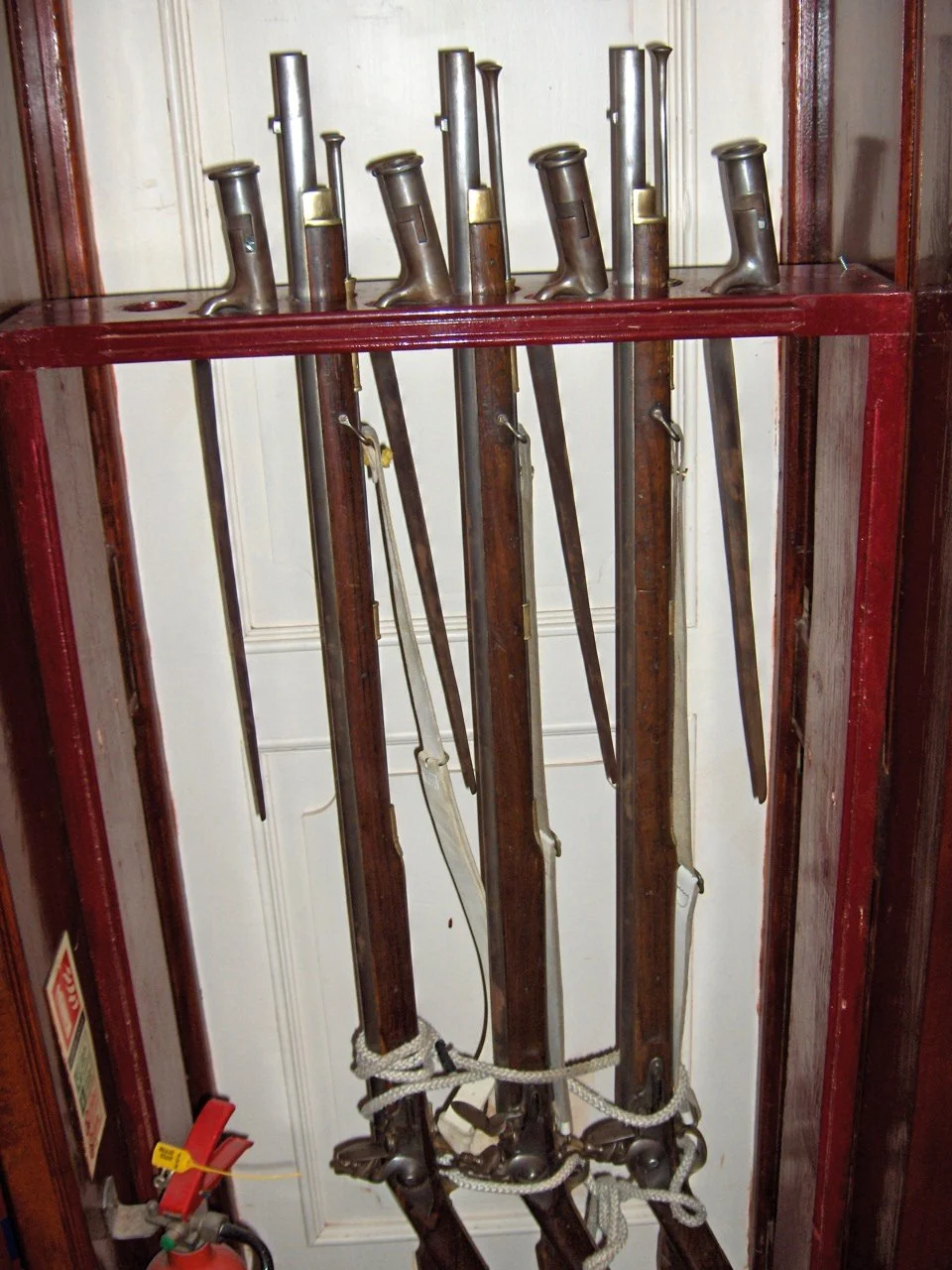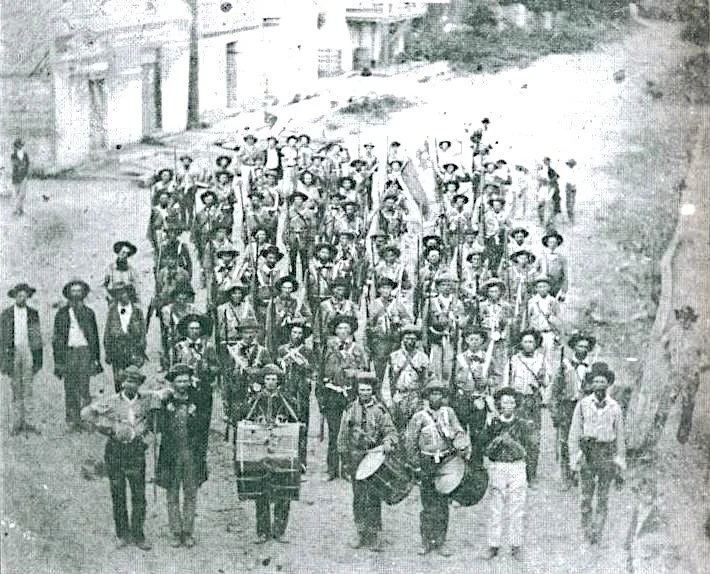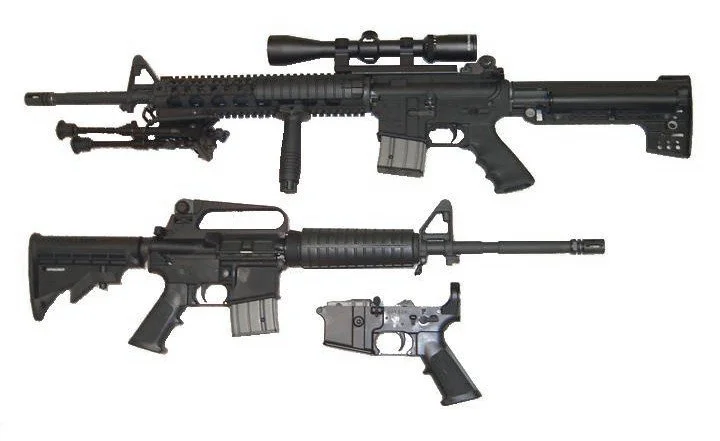
Chris Powell: ‘These kids are so desensitized’
A 1936 poster promoting planned housing as a way to deter juvenile delinquency, showing silhouettes of a child stealing a piece of fruit and the older child involved in armed robbery.
Some muskets
The Hempstead Rifles, a volunteer militia company from Arkadelphia, Ark. in 1861, ready to fight for the Confederacy.
AR-15-style rifles
MANCHESTER, Conn.
Ancient Rome's foremost historian, Tacitus, who often sat at the center of the empire's government, observed, "The more corrupt the state, the more numerous the laws." Today he might add that the nation with ever-more laws is probably becoming not just more corrupt but more dishonest and stupid as well.
The recent mass shooting in Highland Park, Ill., may be a case in point. That state has tough and comprehensive gun-control laws and a "red flag" law -- just like Connecticut. Yet these laws didn't stop the disturbed young man charged with the crime, whose craziness was well known to his parents and the police but prompted no intervention.
In recent days in Connecticut a 15-year-old boy was shot to death and a woman wounded in Fairfield at a birthday party for a 13-year-old that was attended by dozens of people. Then two people were shot in New Haven, for which a 17-year-old was charged, and two more were shot in downtown Norwich, for which an 18-year-old was charged.
Meanwhile a Norwalk City Hall forum on gun violence, attended by Mayor Harry Rilling and U.S. Rep. Jim Himes, produced only a glimmer of understanding. The forum heard that many young men are idle, uneducated, and unskilled and that despite Connecticut's strict laws, legal and illegal guns alike are prevalent here.
Ebony Epps, of Street Safe Bridgeport, added, "These kids are so desensitized." But like everyone else Epps advocated only more "programs," which multiply almost as fast as the laws with a similar lack of effect.
There were no calls at the forum to inquire why the young men are so "desensitized," no calls to inquire into the causes of the social disintegration that is slowly destroying the country.
There was no acknowledgment that the strictest gun laws have accomplished little more in Connecticut's cities than they have in Chicago or New York.
For the country now has a huge underclass -- disengaged, demoralized, alienated and unproductive but heavily armed, and the underclass won't be giving up its guns any faster than the rest of the country will be.
Where has this underclass come from? Is it the fault of Donald Trump and George W. Bush? Why wasn't it civilized under Barack Obama and Bill Clinton? Why are fewer people today prepared to become good citizens?
Anything short of questions like those is a waste of time, except for people aspiring to careers in "programs."
xxx
Some wise guys in Connecticut, angry at the Supreme Court's recent reiteration in the Second Amendment case from New York that individuals have the right to keep and bear arms, are arguing again that the right should be restricted to members of the militia mentioned in the amendment.
Yes, "a well-regulated militia" is the rationale offered by the Second Amendment for the right to keep and bear arms. But this rationale for the right does not establish a requirement. Back when the Bill of Rights was adopted, people didn't have to be formal members of a militia to be eligible to join it or be summoned into it. The Bill of Rights gave the people the right to keep and bear arms just in case.
That is how the Second Amendment was construed back then. People today may consider the amendment's rationale outdated, but it's still in the Constitution and it's not for the courts or state legislatures to change or invalidate it. That can be done only by repealing the amendment through the prescribed constitutional procedures.
The wise guys complain that today's semi-automatic rifles are "weapons of war," far more deadly than the muskets in use when the Bill of Rights was adopted. The wise guys argue that the country's Founders didn't imagine that the right to keep and bear arms included "weapons of war." But of course the Founders imagined it, since back then muskets were "weapons of war" too.
Connecticut's own Constitution suggests that the Supreme Court has construed the Second Amendment exactly as it was understood when it was ratified in 1791. For since 1818, 27 years after ratification of the Second Amendment, Connecticut's Constitution has declared: "Every citizen has a right to bear arms in defense of himself and the state."
It always was and remains an individual right.
Chris Powell is a columnist for the Journal Inquirer in Manchester.
Richard J. August: Founders clearly meant individuals' gun rights
Robert Whitcomb once again displays his anti-gun bias when he “guesses that the Second Amendment was far more about state militias than individual possession” of firearms (“More mental hospitals, please”, June 7 Providence Journal column). To be sure, the intent of the framers of the Constitution, principally James Madison, has been the subject of numerous conflicting decisions by courts at all levels of the judicial system. However, the U.S. Supreme Court in the 2008 Heller decision clearly stated that the Second Amendment refers to the right of an individual citizen to own and carry a firearm. This, however, was not the only case in recent times that addressed this issue.
In a 1990 case involving the Fourth Amendment, Chief Justice William Rehnquist wrote for the majority in Verdugo-Urquidez that “the people” protected by the Second Amendment are “persons” and not a “well-regulated militia” as Mr. Whitcomb and other anti-gunners claim.
The Federalist Papers make clear that the Founders were wary –- some would say fearful -- of a large standing army that could be used by a tyrannical government. Hence, the Second Amendment reference to a militia involved a body of armed men at the state level that could counterbalance such a federal force. The militia in most of the states included all able-bodied males between certain ages who were required to turn out for a muster with a firearm suitable for military service and a specified amount of ammunition.
Madison made his position clear in “The Federalist Papers” number 46, where he referred to “a militia amounting to half a million men” The population of "free white males'' 16 and over in the United States in 1790 was about 808,000, out of total population of about 3.9 million.
The co-author of the Second Amendment, George Mason of Virginia, wrote “A well-regulated Militia, composed of Gentlemen, Freeholders and other Freemen was necessary to protect our ancient laws and liberty from the standing army....” In other words all able-bodied males made up the militia. Mason went on to describe the type of weapon, amount of ammunition and accoutrements that each militiaman was required to possess.
I am tired of people saying that “the militia” means the National Guard. The National Guard was created in 1903 –-more than a hundred years after the Constitution was written and ratified by the states.
I call Mr. Whitcomb’s attention to Section 22 of Article One of the Rhode Island Constitution, which reads, “The right of the people to keep and bear arms shall not be infringed”. How does he suggest one interpret that language?
The state Supreme Court wrestled with that matter and decided that “the people” referred to were indeed a militia. One wonders who the justices believe the Rhode Island Constitution refers to in its preamble, which begins, “The people of the State of Rhode Island and Providence Plantations...” Perhaps “the people” here are white, male landowners who were the only citizens allowed to vote when the document was written.
With respect to the title of Mr. Whitcomb’s piece, one wonders whether he is suggesting that the Ladd School {for the mentally disabled} and the former tuberculosis sanitarium at Zambarano State Hospital be reopened to house those who post whacky You Tube videos and disturbing messages and images on Facebook.
Richard J. August, of North Kingstown, R.I., is a cast member of the weekly radio gun talk show “Lock, Stock and Daria” on WHJJ.
Mr. Whitcomb responds: I'm not anti-gun; I even own a few guns (through inheritance). The dispute is over to what extent government can regulate their use, especially since the sort of guns available now did not exist in the Founders' day, to say the least.




